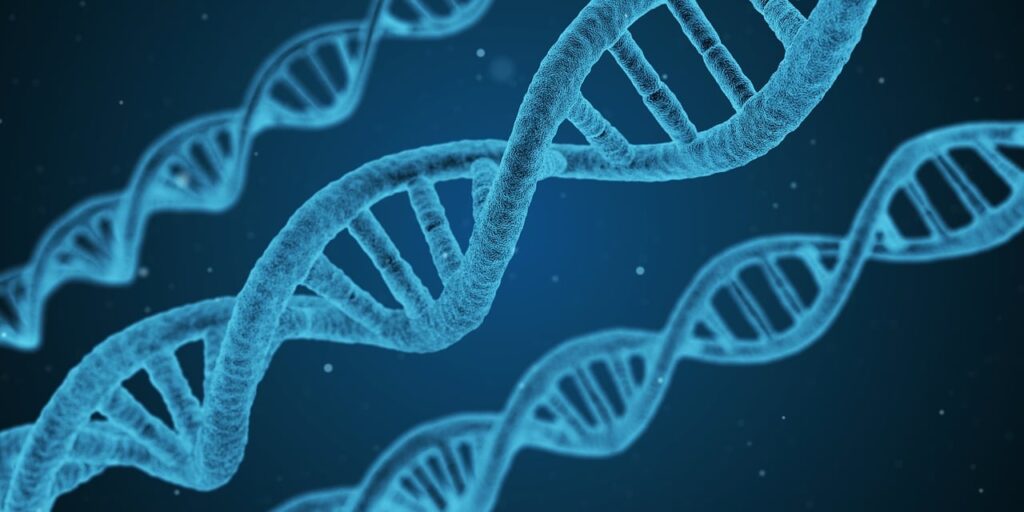
DNA
What you do, eat, think, and breathe all affect your genes.
It changes the expression of your genes, which can cause disease and illness or promote health and wellness.
Your DNA is not just a blueprint to make a human being; its job isn’t finished once it has created you—it’s actually a blueprint for maintaining a human being.
Every single function of your body happens in your cells. Have you ever thought about what is actually happening on a cellular level? How does your body work?
Well, it’s your DNA. It holds the instructions to tell each cell how to do its job. And when something goes wrong, it can create diseases and illnesses.
Epigenetics and Your Genome
Epigenetics is a science that explains changes in gene expression and how environmental factors such as diet, pollution, stress, etc., can change the expression of your DNA without altering the underlying code of your DNA.
The epigenome means “above” or “in addition to” the genome. Your genome (DNA) stays the same and rarely changes in your lifetime, but the epigenome is how your genome gets expressed, using small chemical tags to turn certain genes on or off.
DNA is a blueprint for living life. Every living creature has DNA, which is passed down from your parents. Besides holding your hereditary information, it holds the coding instructions for the millions of different functions our body performs every day to keep us alive.
DNA is basically a set of instructions for your cells to create proteins, which are involved in nearly every single biological process in the body.”
Every single cell has the same DNA, which holds all the genes needed to create all the different types of cells in our body, such as heart cells, lung cells, muscle cells, etc.
But despite sharing the same DNA, these cells exhibit different structures and functions. This difference arises because only the genes required by the specific cell type are expressed.
This is why a heart cell differs from a liver cell, even though both cells possess the exact same DNA.
Within each cell, the genes being expressed differ, thanks to epigenetic tags that turn specific genes on and off.
Most of these epigenetic marks are established before birth. During embryonic development, undifferentiated cells receive signals from their surroundings, causing certain genes to be turned on and others to be turned off through epigenetic tagging, depending on the cell type they will become.
For instance, a heart cell activates genes specific to heart function while deactivating those related to liver or lung function. Conversely, a liver cell activates liver-specific genes while suppressing genes required for heart or hair cell function, and so on.
How our lifestyle affects the expression of our genes

Epigenetic tags are not permanent; they change throughout our lifetime due to different circumstances.
At different stages of our lives, different genes are activated. During puberty, genes for hair growth or tissue growth kick into gear. Pregnancy triggers a whole set of genes for fetal development. Even catching a cold prompts genes to produce antibodies. It’s a choreographed dance of gene expression orchestrated by our epigenome.
Throughout our lives, genes are also subject to activation or deactivation due to environmental and lifestyle factors such as diet, drinking, or smoking, without altering the underlying DNA code.
Diet, for example, can modify epigenetic marks, altering the activity of genes involved in metabolism, inflammation, and disease risk. Regular physical activity has been shown to promote favourable epigenetic changes linked to improved cardiovascular health and longevity.
While exposure to environmental toxins, chronic stress, and unhealthy habits like smoking can wreak havoc on the epigenome, increasing susceptibility to diseases such as cancer. In cancer cells, epigenetic patterns often silence genes that restrain cell growth and promote cell death, unleashing uncontrolled proliferation and tumor formation.
The Impact of Lifestyle
Everything from what we eat to how we handle stress can sway our epigenome. Living in harmony with nature, with a healthy diet and exercise, keeps those epigenetic tags where they need to be. But a life of stress, processed foods, and environmental toxins can send them into a frenzy, leading to disease.
Scientists are still unravelling the intricacies of how lifestyle factors affect our genes. What they do know is that an unhealthy lifestyle can cause epigenetic tags to bind in the wrong places, resulting in gene abnormalities and disease. But the good news is, a healthy lifestyle can reverse these mistakes, restoring balance to our epigenome.
The Power of Nutrition
Nutrients play a crucial role in maintaining epigenetic health. Antioxidants found in foods like green tea and berries help keep epigenetic tags on target. In fact, many fruits, vegetables, herbs, and spices contain compounds that positively influence our epigenome, supporting overall health and wellness.
It’s not surprising to learn that most fruits, vegetables, herbs, and spices all have properties that influence our epigenome for the better.

How our genes get turned on (expressed) and off (silenced)
A bit of science behind epigenetics.
Genes are turned on (expressed) and off (silenced) through a process called epigenetics. This field of study focuses on how external factors influence gene expression without altering the DNA sequence itself.
Two main mechanisms of epigenetic regulation are DNA methylation and histone acetylation:
1. DNA Methylation: Methyl tags attach directly to the gene in the DNA sequence, turning that specific gene off. Removal of methyl tags activates the gene.
2. Histone Acetylation: Histones are proteins around which DNA is wrapped, forming chromatin. Acetyl tags attach to histone tails, loosening the DNA sequence and making gene expression easier. Removing acetyl tags tightens the DNA around the histone, hindering gene expression.
These processes are crucial for maintaining proper gene expression patterns. Correct gene expression ensures that cells function normally, while dysregulation can lead to diseases.
In essence, epigenetics serves as a molecular switchboard, controlling which genes are active or inactive in response to various internal and external cues. Understanding these mechanisms is vital for uncovering the root causes of diseases and developing targeted therapies.
Studies on Epigenetics
Two fascinating studies shed light on the role of epigenetics in gene expression:
Identical Twin Study

Twin studies provide a captivating glimpse into the role of epigenetics. Despite identical DNA, twins develop unique traits as they age, influenced by environmental factors shaping their epigenome.
Identical twins begin life with the exact same DNA and typically have identical epigenetic tags. However, as they age, differences start to emerge. For instance, one twin might struggle with weight, acne, and diabetes, while the other remains thin, athletic, and in excellent health. Despite sharing the same DNA, these disparities arise from changes in their epigenomes. Specifically, they develop different epigenetic tags in various regions of their DNA, resulting in the activation or deactivation of certain genes. This process, though not altering the underlying DNA sequence, plays a significant role in shaping each twin’s unique traits and health outcomes.
Agouti Mouse Study
In 2003, scientists made a ground-breaking discovery: they demonstrated that a mother’s diet can influence the gene expression of her offspring. The experiment involved agouti mice, named for the agouti gene, which predisposes them to obesity, yellow fur, and susceptibility to heart disease, diabetes, and cancer.
Normally, when mice reproduce, their offspring closely resemble the mother. However, in this experiment, two groups of agouti mice were studied. One group was fed a standard diet of mouse food, while the other received a diet supplemented with vitamins and nutrients such as folic acid, vitamin B12, choline, and betaine – all commonly found in vegetables.
The outcome of the experiment was remarkable: the mice in the group fed the supplemented diet produced brown, healthy offspring with the agouti gene effectively silenced. In contrast, the group fed the standard diet produced yellow offspring with the agouti gene activated.
These studies underscore the profound impact of environmental factors on gene expression through epigenetic mechanisms, offering insights into how lifestyle choices and interventions can influence health outcomes across generations.
Conclusion
Our DNA isn’t our destiny.
Studies reveal that our lifestyle choices – what we eat, how we think, and what we do – hold significant sway over our genes.
While our DNA remains constant, epigenetic tags act like genetic switches, turning certain genes on or off based on our lifestyle choices.
If these switches are flipped incorrectly, it can lead to a range of health issues, from heart disease to cancer.
A toxic environment is like a messy room, scattering those switches all over the place, leading to chaos in our genes. On the flip side, a healthy environment acts like a tidy-up crew, putting those switches back in their rightful spots for a healthier outcome.
Our genes don’t have the final say in our health destiny. By understanding and nurturing our epigenome through healthy lifestyle choices, we can take charge of our well-being.
Sources
Alegría-Torres, J., Baccarelli, A., & Bollati, V. (2011). Epigenetics and lifestyle. Epigenomics, 3(3), 267-277. https://doi.org/10.2217/epi.11.22
Fraga, M., Ballestar, E., Paz, M., Ropero, S., Setien, F., & Ballestar, M. et al. (2005). From The Cover: Epigenetic differences arise during the lifetime of monozygotic twins. Proceedings Of The National Academy Of Sciences, 102(30), 10604-10609. https://doi.org/10.1073/pnas.0500398102
Genetics, H., & Work, H. (2021). How do genes direct the production of proteins?: MedlinePlus Genetics. Medlineplus.gov. https://medlineplus.gov/genetics/understanding/howgeneswork/makingprotein/
Murphy, G. (2003). Mother’s diet changes pups’ colour. Nature. https://doi.org/10.1038/news030728-12
O’Neill, C. (2015). The epigenetics of embryo development. Animal Frontiers, 5(1), 42-49. https://doi.org/10.2527/af.2015-0007
Tiffon, C. (2018). The Impact of Nutrition and Environmental Epigenetics on Human Health and Disease. International Journal Of Molecular Sciences, 19(11), 3425. https://doi.org/10.3390/ijms19113425
